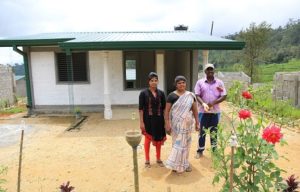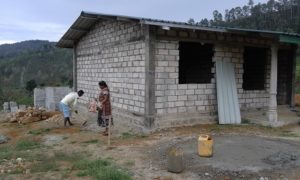New Home for Ms.Manimala’s Family in Dunsinane Estate, Nuwara Eliya
The Indian Housing Project in the Central and Uva Provinces (IHP-CUP) is a housing construction project for estate workers funded by the Government of India. UN-Habitat is implementing the project in Nuwara Eliya district in close collaboration with the Ministry of Hill Country New Villages, Infrastructure and Community Development, Regional Plantation Companies, Estate Worker Housing Cooperative Societies and communities in the area. During the first phase of the project, UN-Habitat is supporting the construction of 554 houses in two estates in Nuwara Eliya for estate worker families who are currently residing in dilapidated line rooms with minimal, basic facilities.
Mrs. K.Manimala, a 43 year old plantation worker is a housing beneficiary of the IHP-CUP project. She has been working as a tea plucker at Dunsinane estate in Nuwara Eliya since 1995. Manimala works six days of the week from 8.00 a.m. till 4.30 p.m. She earns approx. LKR. 15,000 per month, depending on the amount of tea leaves plucked. When she got married, she and her husband P. Balasubramaniyam, who earned a livelihood as a labourer, built a small dwelling place on land provided to them, which was owned by the regional plantation company. Over time, the couple had three children – Shamila, Balasanthiran and Jayakumar. Their house, which the couple improved over time, is about 400 square feet with one bedroom. However, with three children, the house didn’t provide adequate space or privacy for the family members. Currently, Manimala’s daughter – Shamila is following a preschool teacher
training course, while the two sons, Balasanthiran and Jayakumar work as tailors at a garment factory. It has been a long held dream for the family to have a permanent house with adequate space for all the family members to live comfortably.
The construction of the houses is undertaken through the Estate Worker Housing Cooperative Societies (EWHCS) in each plantation. The High Commission of India channels funds through the EWHCS who hire skilled construction workers, bulk purchase building materials and construct the houses. As the project is implemented through a participatory people’s process, estate worker families, including Manimala’s family are closely involved in planning and monitoring of housing construction. The families are also given the opportunity to provide their own labour and financial contributions towards the house construction in the spirit of the homeowner driven process.When UN-Habitat commenced the IHP-CUP project in Dunisane estate, Ms. Manimala was selected as a housing beneficiary for assistance through the first phase of the project. The Elpitiya Plantations PLC in charge of managing the estate, has provided land for the Housing Project in two locations – Factory Division site and Middle Division site. Manimala’s house is being constructed at the “Factory Division Site” on a seven perch block of land. Altogether, 8.44 acres has been allocated at Factory Division site for the Indian Housing Project.
To construct each house, LKR. 950,000 is provided in four instalments by the Indian High Commission. Having commenced construction activities in September 2016, Manimala’s house is now nearing completion. UN-Habitat has been providing technical guidance including the preparation of house type plans, Bills of Quantities (BOQs) and technical supervision on the construction aspects including the selection of quality building materials.
Manimala’s house is 550 square feet, consisting of a living room, two bedrooms, a kitchen, front verandah and an attached toilet. The house has been constructed using fair-faced cement blocks for walls. The roof has been constructed with zinc aluminium roofing sheets and galvanized C-Channels for the roof purlin. Door and window frames have been constructed with timber. In addition, electrical wiring, plumbing and paint work has been completed.
The family has also actively participated in the construction of their house in order to reduce the cost of construction. They have undertaken foundation and toilet pit excavation work and landscaping the garden. The house is now nearing completion and the family is hoping to move in soon.
“We are very happy to have been included in the Indian Housing Project. We have been working hard to complete the house by providing our own labour support as the grant amount given for the house will not cover the full construction cost. So our contributions also help to bring the cost down. This is a wonderful opportunity to have our very own permanent house. We now have space to entertain our friends and family” Manimala and her husband stated.
Due to the fragile and complex nature of the hilly terrain in the central province, disaster risk reduction measures have been incorporated into the house construction. These include deep column footings, step foundations, corner columns, external plinth beam, continuous lintel and roof anchoring. Environmentally friendly building materials and techniques are used in all houses, including the use of fair-faced blocks for walls, twin pit latrines and smoke free chimneys. Fair faced block work eliminates the need of plaster, thereby saving materials and labour. Twin pit latrines eliminates the need for deep excavations, thereby improving disaster resilience and reducing ground water contamination, while providing compost for kitchen gardens and tree planting activities to improve the environment. Waste water and rain water are gainfully used in watering the kitchen gardens. Disaster resilient landscaping features have been introduced in all settlements which include natural and structural slope stabilization elements with live fences erected around the houses. Geo-technical clearance of the National Building Research Organization (NBRO) has been obtained for all the sites.
The overall IHP-CUP project involves the construction of 4,000 houses and UN-Habitat is one of four implementing agencies of the project. The Indian Government is providing approximately US$30 million funding for the project over the next two years. The 4,000 houses is a part of India’s overall commitment to fund the construction of 50,000 houses in conflict-effected and plantation regions of Sri Lanka.


